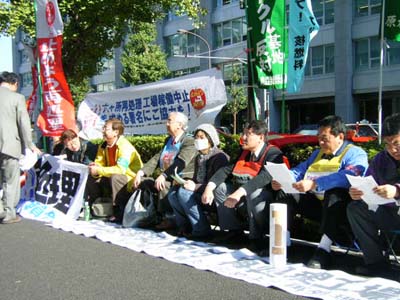 On November 18th Japan Nuclear Fuel Ltd. (JNFL) announced that active trials (using spent nuclear fuel) at the Rokkasho Reprocessing Plant will be delayed two months to February 2006. Start-up of Rokkasho will also be pushed back two months to July 2007.
On November 18th Japan Nuclear Fuel Ltd. (JNFL) announced that active trials (using spent nuclear fuel) at the Rokkasho Reprocessing Plant will be delayed two months to February 2006. Start-up of Rokkasho will also be pushed back two months to July 2007.
The announcement was made while demonstrations were being held in Tokyo opposing the reprocessing plant in general and the impending active trials in particular. Sit-ins, demonstrations and public meetings were held from November 16th - 19th. Two overseas speakers were invited to participate. Martin Forwood of Cumbrians Opposed to a Radioactive Environment spoke about problems at the THORP reprocessing plant in the UK. He emphasized that the Rokkasho Reprocessing Plant project should be cancelled before similar problems arise in Japan. Professor Hong Seong Tae of People's Solidarity for Participatory Democracy gave a South Korean perspective on Rokkasho, stressing proliferation and environmental concerns. Martin also spoke in Morioka (Iwate Prefecture) on the 20th and in Aomori on the 21st.
The major reason for the two-month delay is modifications to the vitrified high-level waste storage facility (see NIT 105). It was discovered that, due to a design error, the cooling system of buildings in this facility was inadequate. The governor of Aomori Prefecture indicated that he wouldn't give his approval for active trials until this problem was fixed. JNFL now says that these modifications will be completed by the end of this year.
On November 9th JNFL released its latest progress report on the uranium trials (using depleted uranium), which are currently being conducted. The report failed to provide evidence to support JNFL's claim that the uranium trials are proceeding smoothly. Rather, it showed that JNFL is nowhere near ready to enter the active trial phase. Of greatest concern, there is no indication that JNFL plans to undertake a true test of the whole process. JNFL claims that it will conduct comprehensive trials of the whole plant, but there is no indication that it will run uranium from beginning to end in such a way that inputs and outputs can be quantitatively compared. Unless a test is conducted showing how accurately inputs and outputs balance, it will be impossible to judge whether it is safe to proceed to active trials.
In addition to the general problem of testing the whole plant, CNIC is also unsatisfied with the information that has been released. While we recognize that nuclear safeguards requirements impose limits on what can be made public, in this case essential information is being withheld simply for commercial confidentiality reasons. On the basis of the information released, it is impossible to ascertain how much progress has really been made with the uranium trials. The report repeats formulas such as "within the target level", providing few numerical values to back up its assertions.
Active trials entail far greater dangers than the uranium trials. They involve much higher levels of radioactivity and they carry the risk of a criticality accident. These are not things to be treated lightly for the sake of meeting arbitrary schedules. It is simply not good enough for JNFL to say 'trust us' and expect to be allowed to proceed to active trials.

